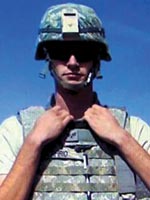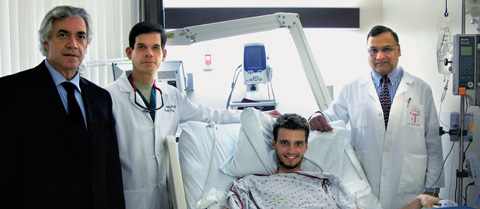 |
| Five days before Thanksgiving, U.S. Air Force Senior Airman Tre Porfirio, 21, was shot in the back in Afghanistan |
Days before Thanksgiving, on a remote Army outpost in Afghanistan, an insurgent shot U.S. Air Force Senior Airman Tre Porfirio three times in the back. The 21-year-old Georgia native’s prognosis was grim. He had massive internal injuries, including a pancreas shattered beyond repair. Without the insulin- and enzyme-producing organ, the serviceman faced a future with severe diabetes and its worst complications: blindness, kidney failure, stroke.
But today Porfirio is recovering and expected to live a normal life, thanks to an unprecedented transplant of his own insulin-producing cells performed Thanksgiving Day at Walter Reed Army Medical Center with the assistance and guidance of Camillo Ricordi, M.D., scientific director of the Miller School’s Diabetes Research Institute.
“This was the first successful post-traumatic autologous pancreatic islet transplant performed in an emergency procedure,’’ Ricordi said before a news conference announcing the historic procedure. “To be able to give back to a wounded warrior—I couldn’t think of a better way to spend Thanksgiving.’’
Indeed, the professor of surgery who invented the device and method for isolating large numbers of islets and transplanting them into the liver to reverse diabetes didn’t hesitate when Walter Reed doctors enlisted his help the day before Thanksgiving.
Giving his colleagues instructions for shipping what remained of Porfirio’s pancreas from Washington, D.C., to Miami, Ricordi readied his team for a race against the clock that began when the organ arrived at 11 p.m.
For the next six hours, Ricordi and the cell-processing team isolated and repurified more than 220,000 of Porfirio’s islets, suspending them in a specialized cold solution in a Ricordi infusion bag for the flight back to Washington.
By Thanksgiving afternoon, under Ricordi’s telemedicine-assisted guidance, Walter Reed surgeons injected the islets into Porfirio’s liver via his portal vein. Two weeks later the transplanted cells were producing insulin in the normal range.
 |
| Doctors who helped save Tre Porfirio’s life with a groundbreaking islet transplant visit the recovering airman at Walter Reed Army Medical Center on December 15. From left are Camillo Ricordi, M.D., of the Miller School, and Craig Shriver, M.D., and Rahul Jindal, M.D., of Walter Reed. |
Miller School Dean Pascal J. Goldschmidt, M.D., called the collaboration “one beautiful accomplishment of two teams working to save a life from diabetes.’’
The emergency procedure holds great promise for other patients who lose their pancreas due to trauma or, more commonly, chronic pancreatitis. If they are within a six-hour flight from Miami, their damaged pancreas could be shipped to the DRI, where the islets would be processed and returned for transplantation—with telemedicine-assisted guidance, if needed.
Such autologous transplants have a huge advantage over the more usual islet transplant using cells from cadavers: There is no risk of rejection. Ricordi thus sums up the lesson surgeons everywhere should heed: Never throw away a damaged pancreas.
“I am ever grateful to all the physicians and scientists who made this happen,” said Porfirio’s father, Karl. |


